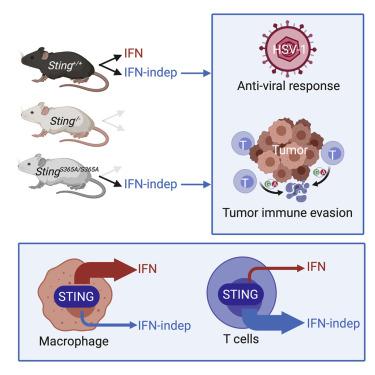Immunity ( IF 25.5 ) Pub Date : 2020-07-07 , DOI: 10.1016/j.immuni.2020.06.009 Jianjun Wu 1 , Nicole Dobbs 1 , Kun Yang 1 , Nan Yan 2

|
Type I interferon (IFN) response is commonly recognized as the main signaling activity of STING. Here, we generate the Sting1S365A/S365A mutant mouse that precisely ablates IFN-dependent activities while preserving IFN-independent activities of STING. StingS365A/S365A mice protect against HSV-1 infection, despite lacking the STING-mediated IFN response. This challenges the prevailing view and suggests that STING controls HSV-1 infection through IFN-independent activities. Transcriptomic analysis reveals widespread IFN-independent activities of STING in macrophages and T cells, and STING activities in T cells are predominantly IFN independent. In mouse tumor models, T cells in the tumor experience substantial cell death that is in part mediated by IFN-independent activities of STING. We found that the tumor induces STING-mediated cell death in T cells to evade immune control. Our data demonstrate that mammalian STING possesses widespread IFN-independent activities that are important for restricting HSV-1 infection, tumor immune evasion and likely also adaptive immunity.
中文翻译:

哺乳动物 STING 的干扰素独立活性介导抗病毒反应和肿瘤免疫逃避。
I 型干扰素 (IFN) 反应通常被认为是 STING 的主要信号传导活动。在这里,我们产生了Sting1 S365A/S365A突变小鼠,它精确地消除了 IFN 依赖性活性,同时保留了 STING 的 IFN 独立活性。尽管缺乏 STING 介导的 IFN 反应, Sting S365A/S365A小鼠仍可防止 HSV-1 感染。这挑战了普遍的观点,并表明 STING 通过不依赖 IFN 的活性来控制 HSV-1 感染。转录组分析揭示了巨噬细胞和 T 细胞中广泛存在的不依赖于干扰素的 STING 活性,并且 T 细胞中的 STING 活性主要不依赖于干扰素。在小鼠肿瘤模型中,肿瘤中的 T 细胞经历大量细胞死亡,部分是由不依赖于 IFN 的 STING 活性介导的。我们发现肿瘤会诱导 T 细胞中 STING 介导的细胞死亡,以逃避免疫控制。我们的数据表明,哺乳动物 STING 具有广泛的不依赖于 IFN 的活性,这对于限制 HSV-1 感染、肿瘤免疫逃避以及可能的适应性免疫非常重要。









































 京公网安备 11010802027423号
京公网安备 11010802027423号